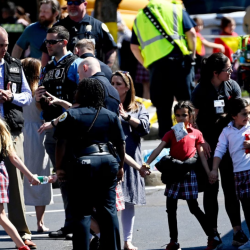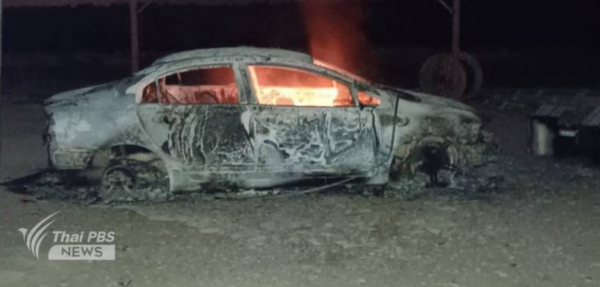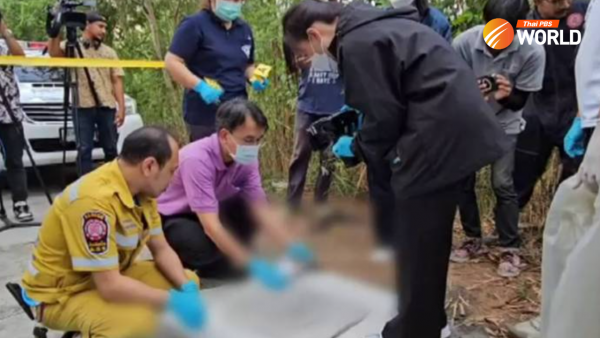Deadly shooting sprees point to need for mental healthcare in Thai armed forces

During the past few years, Thailand has witnessed several shocking mass killings by lone shooters, something is never before seen in its history. Perpetrators of this deadly violence have hailed from military or police backgrounds, prompting a need to seriously address the mental health of people working in these armed forces.
Statistics show soldiers and police officers generally experience a higher level of stress than people working in other fields. They also tend to suffer a much higher risk of mental health issues.
“With access to weapons, they have a higher chance of committing suicides or attacking others as well,” said Dr Varoth Chotpitayasunondh, spokesman for the Mental Health Department.
He was speaking after a police inspector opened fire while at home in Bangkok’s Sai Mai district on March 14. Police surrounded the house overnight and began negotiating with the rogue officer, who continued to fire his gun from the house. A commando team raided the house the next day and the policeman was shot six times, dying from his wounds in hospital later the same day.
“Throughout our efforts to negotiate with him, we considered him a patient, not a criminal,” Deputy National Police Commissioner General Torsak Sukvimol said.
What went wrong?
Although the disturbed inspector injured no one, his neighbors were frightened. The neighborhood was sealed off as more than 100 policemen stepped in to try to resolve the situation. Fears ran high that the officer would go berserk, resulting in a repeat of massacres seen in Nakhon Ratchasima in 2020 and in Nong Bua Lamphu last year.
In 2020, a soldier went on a shooting rampage after he killed his commanding officer and relatives over a conflict. His attack lasted 17 hours and cost the lives of 29 people with another 57 injured. Dozens of people were trapped in a shopping mall as the gun-toting soldier hunted for victims. The killing spree, which was reportedly triggered by a barracks business deal gone wrong, ended only when he was shot dead by security forces.
In 2022, a former policeman killed 36 people, mainly young children, after he was dismissed from the police force while facing drug charges. The bloodbath, which ended with the soldier’s suicide, made headlines across the world.
Because the perpetrators died in the violence, the motive for their mass killings was never ascertained. Besides, psychologists believe there are often multiple factors at play when someone loses control and resorts to violence. Among common causes are health problems, depression, relationships woes, debts, narcotics, and work-related problems.
What about mental well-being?
Colonel Winai Thongchai, a clinical psychologist at the Police General Hospital, said mental issues usually develop after people have struggled with other problems.
“When screening shows that a police officer has a mental issue, we will reach out to help him/her cope. But we need other units to tackle other problems in order to ensure such situations are resolved,” he explained.
Police officers are screened for psychological issues during their annual health checks. Results are meant to reveal if any member has signs of depression, panic, or suicidal tendencies. Those found to be in need of help are given treatment at a medical facility close to them.
“We also have the Depression Care Hotline, which is accessible round the clock,” he added.
However, Winai said police officers rarely come forward for treatment due to the taboo about mental illness within the force and the perception that they have to be tough.
“Police around the world tend to think that they must be strong. If they seek help, they feel like they are weak. They also worry about stigmatization. They are afraid that as soon as they seek psychiatric help, they will be seen as burdens to their agencies,” he explained.
Winai said the force should assign a personnel unit especially to take care of officers’ health, including their mental health. Medical teams could provide support when the need is detected and confirmed.
“Also, police personnel must be educated about mental health so they know it is okay to seek counseling when the need arises,” the psychologist explained. “With proper education, supervisors would also know when to intervene. If you understand warning signs, you should be able to step in before things spiral out of control.”
Like fire drills, mental-health emergency exercises should be practiced by police units so they know what to do if an emergency occurs, he said.
“Importantly, efforts should be multi-dimensional. They should cover health, welfare, and more,” he said.
Drugs, guns and more
Varoth said drug abuse and gun ownership were contributing factors in some mass killings. Changes must be made therefore to promote zero tolerance of drug abuse while also tightening gun control laws.
“Don’t just think colleagues may want to try drugs and will not get addicted. Don’t think it’s absolutely fine to get drunk,” Varoth said. “If you notice that your colleague is showing signs of mental issues, make sure they get help. If they get timely help, we can worry less about them having guns.”
Stress piles up in police force
Because police and military culture demands serious discipline and a rigid line of command, police officers and soldiers tend to mechanically take orders. But when their mental health is shaken, they need someone to listen to them. Struggling to comply with their organization’s culture may take a toll on them.
“Supervisors must recognize that they should not exert top-down practices only. A ‘top-up’ culture should also be part of their life,” Varoth said.
The high stress level among members of the Royal Thai Police reflects in a higher suicide rate than in the general populace. Overall, 14 out of 100,000 Thais kill themselves each year, but that rises to 30 out of 100,0000 for police officers.
Learning the lessons
Looking at things optimistically, Varoth said recent shooting sprees had reminded all Thais that it was high time the country seriously addressed the causes of such violence.
“I hope all agencies recognize the urgency of the issue. Policies must be adjusted to curb and prevent violence. Let’s hope we have learnt a lesson and push for positive changes,” he said.
By Thai PBS World






